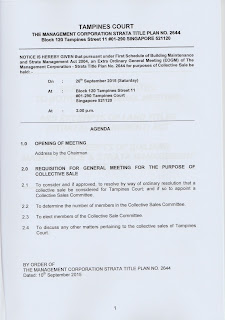A Minority Owner's chronicled journey through 3 Collective Sale attempts; the last one being successful. TC was a 560 ex-HUDC estate with a thriving community spirit (up until the enblocs that is). I have moved on to a new, 37 unit Freehold estate. Life is quiet now with zero community feeling.
Tampines Court 1985-2018
Nov 13, 2015
Nov 7, 2015
Oct 8, 2015
Gilstead Court COA overturns HC Decision- or BULLIES BEWARE!
Another brilliant decision handed down by the Court of Appeal.
In a nutshell:
In a nutshell:
- The High court has no power to change the terms and conditions set out in the CSA after the fact - in other words they cannot first rule that there was bad faith and then 'fix it' so that the sale can go through. Hurray to that.
- The CSA cannot contain punitive clauses for non-signatories - because
an SP has the
absolute right not to sign the CSA, for whatever reason he or she might have.
The law still expects that such an SP will be treated fairly...... No
SP should ever feel compelled to sign a document he or she does not agree with
because of undue group pressure or the fear of suffering penal consequences,
whether covert or overt.
Sep 27, 2015
Sep 16, 2015
EOGM 1
EOGM 1 for the purposes of a Collective Sale.
I didn't attend but the quorum was reached and the third Sale Committee elected (10 members, I believe).
May 6, 2015
Mar 22, 2015
Tampines Ave 10 Parcel D Land Sale
http://www.ura.gov.sg/uol/land-sales-repository/Sites/tampines-av10-pd-cl.aspx
BIDS
AWARD OF TENDER
(04 May 2015)
BIDS
AWARD OF TENDER
(04 May 2015)
Mar 21, 2015
Mar 20, 2015
Feb 17, 2015
Gilstrad Court: High Couet gives go-ahead to Sale
The High Court has finally given the fractious collective sale of Gilstead Court condominium the green light.
It has ordered that contentious clauses at the heart of the long-running dispute be struck out from its sales agreement.
The dispute, which began in July 2013, centred on financial penalties imposed on owners who had objected to the sale.
Under the collective sale agreement, consenting sellers had to contribute towards a common fund set up for costs related to the $150.2 million sale en bloc. But objecting owners were asked to fork out twice the amount, to be withheld from their share of the net sale proceeds and shared equally among the consenting owners.
The collective sale committee, led by former Supreme Court judge Warren Khoo, had already got the requisite 80 per cent of owners to consent for the Strata Titles Board's (STB) sale approval.
The objecting owners, under other clauses in the agreement, had been required to pay an extra $135,000 for the approval proceedings, of which, a $120,000 legal consultant's fee was disputed.
But in a 69-page judgment obtained by The Straits Times yesterday, the court made clear that the dissenting owners have "basic rights" to object to the collective sale and were not bound by the terms of the agreement since they were never signatories.
"This cannot be right. Otherwise, a majority can embark on an ill-advised collective sale and yet call upon the detractors to contribute to the costs thereof," said Justice Quentin Loh. It would, by extension, be "unjust and impermissible", by a contract drawn among the majority owners, to have objecting owners bear costs related to the proceedings.
Also, it is within the High Court's power to decide who should bear the costs related to STB proceedings, not the collective sale committee or majority owners, he added. In this case, costs related to the sale en bloc should be paid by all owners according to their unit's share value.
Developer Tuan Sing had earlier made an offer to bear the $135,000 to end the dispute, a move which Mr Khoo alleged was in breach of a clause which warned against "illicit payments" in the sales agreement.
Mr Khoo, represented by Senior Counsel Michael Khoo, later withdrew the allegations, but was told to pay $20,000 for work by Senior Counsel Davinder Singh and Jaikanth Shankar of Drew & Napier while representing Tuan Sing for the High Court hearing.
There was no "surreptitious offer" to any of the owners, said Justice Loh, since it was made "openly" to all. Tuan Sing's offer eventually lapsed.
Though it would have been "simpler and neater" to refuse the sale, Justice Loh pointed out that it would not have been in the interests of the majority owners to do so, given the "present state" of the property market.
Mr Chong Chou Yuan, chief financial officer at Tuan Sing, told The Straits Times: "We are pleased with the court's judgment... If the sale goes through, we'd be more than happy to accept it because it's a very good location."
Cheryl Ong
This article was first published on February 14, 2015.
Subscribe to:
Comments (Atom)






















